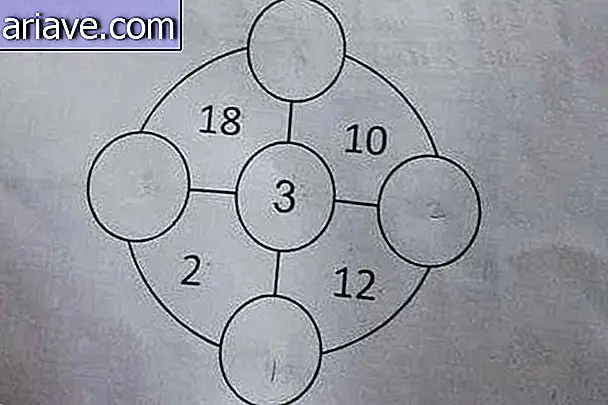New Year: Understand Why Not All Your Wishes Come True
The end of a year is marked by moments of parties between family and friends. Suppers, gifts, hugs, meetings, and of course some superstitions. Eat 12 grapes, skip 12 waves, wear a specific color of lingerie, and even make a list of things you want to accomplish next year.
On December 30, people often remember any frustration they experience during the year and end up hoping to do it right the next year. Another thing you already know, though not easy to admit, is that this list of goals for the year almost always dies before February even comes.
Ever wonder why this happens? Could you do everything you wanted to have done in 2017? If you did it, congratulations. If you can't, rest assured, you're part of the largest share of people who make New Year's promises - and just to give you an idea, 88% of people fail to keep their promises.
As well?

Before you give up on improving your life - it can't, huh! - Let us know that Science explains how our darn brain understands our goals, lists, and promises. In addition, some researchers have discovered what must be done so that a wish list can become a wish list.
For you to understand very well how this mechanism of self-sabotage works, just follow a very simple line of reasoning, then follow us: To achieve a goal, you need to have an abstract thing known as willpower. Just as Strength is a greatness that overcomes inertia when it comes to Physics, in the motivational sense of it, it is the willpower that moves you toward your goals, but in a less obvious way.
You can!

Willpower, for example, is that effort your brain makes so that you jump out of bed every day even wanting to sleep until noon. It is also the willpower that makes you clean even when you want to lie down watching a movie and eating popcorn. This goes for everything: diet, gym, work routine, study schedules. If you stop to think, you will find that your brain is driving you all the time.
The brain area that works when the mission is to transmit such willpower is behind your forehead, in a region known as the prefrontal cortex. This segment has other functions as well, among them being staying focused, storing short-term memories and solving abstract tasks.
Overload

When you make your little list with 72 New Year's goals, that same region of your brain is going to be kind of overloaded and simply unable to handle all the tasks you would like to be able to do. Then nothing works and you end up with another year complaining and making a list a little longer than the previous year.
Professor Baba Shiv has done a study to better understand the mechanism of New Year's promises. One of his assessment methods was quite simple: two groups of students were to perform two different tasks, the first having to remember a two-digit number sequence and the second seven. Then they had to walk a little and eventually had to choose between chocolate and fruit salad.
The group that had to remember the seven-digit sequence ate chocolate, which Shiv said was strong evidence that the prefrontal cortex was tired and needed sugar for energy. This leads to the conclusion that, like a muscle, the prefrontal cortex - and the whole brain - needs to be exercised and trained so as not to risk overtiredness and quitting midway.
Have a solution?

If you have never practiced physical activity in your life and decide to take part in a scavenger hunt consisting of running, cycling and Olympic gymnastics, you may well give up in the first ten minutes. It's the same with the brain: suddenly you think it's a good idea to fill you with difficult and unprecedented tasks. And get angry when you can't.
But what is the solution then? Well, we have known the solution for a long time. You didn't learn to walk, talk or write overnight, did you? Why do you expect to lose weight in a week or learn a new language in a month? Why do you insist on doing everything at the same time and with great intensity in the beginning? You haven't even noticed it yet, but what needs to be done is calm, patience, baby steps. Crawl if need be.
Abstract, no!

According to Stanford University professor BJ Foog, people get lost in choosing their new year goals because they don't think about behavioral changes but abstract desires. When something is abstract, your brain gets confused. For example, if you say you want to be a better person at work, you don't specify very much what it means.
You need to better define what you want to improve in your work: punctuality, relationships with colleagues, less gossip with friends, and so on. Your brain can't focus on abstract things. Accept the fact.
Part of you

If you can make your plans so that they seem instinctive, that they seem to be part of who you are, not a forced thing, the chances of your goals being met are much greater. You know what's the problem? Some research has indicated that over 90% of year-end wishes have nothing to make them part of what you are.
If you want something to work, you need to make it a habit, and preferably make it small. The Buffer site has selected some of the most common examples of new year goals and has adapted these goals to the small steps scheme. Check out:
- Goal : Quit smoking. Reframing : quit smoking right after breakfast;
- Goal : Have a healthy diet. Reframing : swapping the white bread for breakfast with a banana;
- Goal : lose weight. Reframing : After work, on the way home, find a way to take a walk or maybe climb stairs and leave the elevator. Here it is also worth exchanging white bread for a banana;
- Goal : Stress less. Reframing : Meditate for 2-3 minutes every day, just after waking up, before getting out of bed.
Chances and tips

If you make these adaptations, your chances of success will be 50% higher, after all, they will not be abstract but rather objective, and can easily become a habit. If you are still unconvinced, here are some more tips for preparing your 2014 goal list:
1 - Choose only one goal
That way you won't be overwhelmed. Even if you have several things to change, choose the most important and stick with it.
2 - Tell to friends and family
The people around us have immense power of interference over us. Tell some trusted people what your goal of the year is - so you'll have someone to count on and probably have someone stimulating your attitudes.
3 - Adopt Rewards
Positive responses will make you increasingly committed to your goal. Also, it's good that you reward yourself from time to time for doing everything right - if you've been able to stop smoking, buy that nice shoe, for example.
***
Now that you know all about goal lists, try putting it into practice and good luck!
* Posted on 12/17/2013











